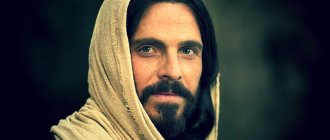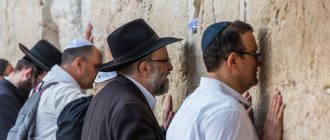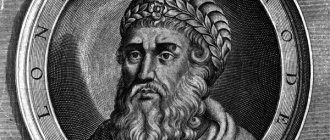Old Testament
According to the prophets, the purpose of the coming of the Messiah into the world was the foundation of the Kingdom of God, into which a new, spiritually renewed Israel was to enter. The prophets describe this Kingdom in some detail. In our work, we set ourselves the goal of presenting prophecies relating to the Messiah and showing how they were fulfilled in Jesus Christ. We will present here the prophecies relating to His Kingdom briefly, dwelling only on the main and most general qualities of this Kingdom. Speaking about the Messianic Kingdom, the prophets depicted it as a society of spiritually renewed people. Moreover, this society should have included, in addition to Jews, other peoples. The main feature of this Kingdom should have been the abundance of grace-filled gifts in it. Being the Kingdom of God, it is stronger than all earthly kingdoms and will outlive them.
Having received its beginning from the time of the coming of the Messiah into the world, it must be transformed in its appearance at the end of the existence of the world, after God’s general judgment of the nations. Then, on the new, transformed earth, all physical disasters will disappear, and bliss, immortality and the fullness of God’s blessings will reign among the citizens of this Kingdom. Here, in a few words, is the essence of these prophecies. Now let's look at a few specifics. Speaking about messianic times, the prophets indicated that they would be the time of the New Covenant (union) of God with people. As we know, the Old Covenant of God with Israel was concluded under Moses at Mount Sinai. Then the Jews pledged to fulfill the commandments written on the stone tablets, receiving as a reward from God the land promised to Abraham (the promised land). This is what the prophet Jeremiah writes about the New Covenant: “Behold, the days are coming, says the Lord, when I will make a new covenant with the house of Israel and with the house of Judah, not like the covenant that I made with their fathers in the day when I took them by the hand, to bring them out of the land of Egypt; They broke that covenant of mine, although I remained in covenant with them, says the Lord. But this is the covenant that I will make with the house of Israel after those days, says the Lord: I will put My law within them, and write it on their hearts, and I will be their God, and they will be My people. And they will no longer teach one another, brother to brother, and say, “Know the Lord,” for they will all know Me, from the least of them to the greatest, says the Lord, because I will forgive their iniquity, and I will remember their sins no more” (Jer. 31, 31–34). The Prophet Isaiah calls the New Testament eternal: “Incline your ear and come to Me: listen, and your soul will live, and I will give you an everlasting covenant, the unfailing mercies promised to David” (Isa. 55:3; Acts 13:34) . The peculiarity of the New Testament, in contrast to the Old, should have been that, in addition to the Jews, other peoples would be attracted to it, who together would form the new Israel, the blessed Kingdom of the Messiah. The prophet Isaiah wrote about this calling of the pagan peoples in the name of God the Father: “Not only will You (the Messiah) be My servant for the restoration of the tribes of Jacob and for the return of the remnants of Israel, but I will make You the light of the nations, so that My salvation will reach to the ends of the earth.” (Isa. 49:6). And a little later, the prophet Isaiah expresses joy on this occasion: “Rejoice, barren, barren; shout and shout, you who have not suffered from childbirth; because she who is abandoned has many more children than she who has a husband, says the Lord. Enlarge the place of your tent, expand the covers of your dwellings; do not be shy, make your ropes longer and strengthen your stakes; for you will spread to the right and to the left, and your descendants will take possession of the nations and inhabit the desolate cities” (Isa. 54: 1-3, see Gal. 4: 27). Here the prophet depicts the Old Testament Jewish Church as a married woman, and the pagan nations as a barren woman who will later give birth to more children than the first wife. Hosea also predicted the calling of the Gentiles to take the place of those who had fallen away from the Kingdom of the Jews (see Hos. 1:9, 2:23). In Old Testament times, membership in the Kingdom was determined by nationality. In New Testament times, a necessary condition for belonging to the Kingdom of the Messiah will be faith, as Habakkuk wrote: “The righteous... will live by faith” (Hab. 2:4; see Isa. 28:16). Unlike the Old Testament law, written on tablets of stone, God's new law will be written on the very hearts of the members of the New Israel, that is, the will of God will become, as it were, an integral part of their being. This writing of the law on the hearts of renewed Israel will be accomplished by the Holy Spirit, as the prophets Isaiah, Zechariah and Joel write about. As we will see, the prophets, speaking about the grace of the Holy Spirit, often called it water. Grace, like water, refreshes, cleanses and gives life to a person’s soul. The prophet Isaiah was the first to predict spiritual renewal: “I will pour water on the thirsty land and streams on the dry land; I will pour out My spirit on your descendants and My blessing on your descendants” (Is. 44:3). In Zechariah we read: “And on the house of David and on the inhabitants of Jerusalem I will pour out the spirit of grace and supplication, and they will look upon Him whom they have pierced, and they will mourn for Him as one mourns for an only begotten son, and mourn as one mourns for the firstborn.” (Zechariah 12:10). Here, by the way, the repentant sorrow that the inhabitants of Jerusalem experienced after the death of Christ on Golgotha is predicted (see John 19:37; Acts 2:18). The prophet Ezekiel also wrote about spiritual renewal: “And I will take you from the nations, and gather you from all countries, and bring you to your own land. And I will sprinkle clean water on you, and you will be cleansed from all your filthiness, and I will cleanse you from all your idols. And I will give you a new heart, and I will put a new spirit within you; And I will take the heart of stone out of your flesh, and give you a heart of flesh. I will put My spirit within you and cause you to walk in My commandments and keep My statutes and do them” (Ezek. 36:24-27). Joel’s next prophecy complements the previous three: “And it shall come to pass after this that I will pour out My Spirit on all flesh, and your sons and your daughters shall prophesy; Your old men will dream dreams, and your young men will see visions. And also on the male and female servants in those days I will pour out My Spirit. And I will show signs in heaven and on earth: blood and fire and pillars of smoke. The sun will turn into darkness and the moon into blood before the great and terrible day of the Lord comes. And it shall come to pass: whoever calls on the name of the Lord will be saved; For in Mount Zion and in Jerusalem there will be salvation, as the Lord has said, and for the rest whom the Lord will call” (Joel 2:28-32). These predictions began to be fulfilled on the fiftieth day after the resurrection of Christ (see Acts 2:18; cf. Isa. 44:3-5; Ezek. 36:25-27; Rom. 10:13). The end of Joel's prophecy about the darkening of the sun refers to events before the end of the world. The Messianic Kingdom is sometimes depicted by the prophets as a high mountain. This symbol, taken from the sacred Mount Zion, is suitable for the Messianic Kingdom because it, like a mountain, resting on the earth, lifts people up to heaven. This is how the prophet Isaiah writes about the Kingdom of the Messiah: “And it will come to pass in the last days that the mountain of the house of the Lord will be set at the top of the mountains and will be exalted above the hills, and all nations will flow to it. And many nations will go and say: Come, and let us go up to the mountain of the Lord, to the house of the God of Jacob, and He will teach us His ways, and we will walk in His paths; For out of Zion will come the law, and the word of the Lord from Jerusalem” (Isa. 2:2-3). The prophets called Jerusalem not only the most capital city of the Jewish state, but also the Kingdom of the Messiah. So, for example, Isaiah exclaimed: “Arise, shine, O Jerusalem, for your light has come and the glory of the Lord has risen upon you” (Is. 60:1). This allegorical image of the Messianic Kingdom is repeated with new details in the vision of the prophet Daniel. In addition to the mountain, he also talks about a stone that broke away from the mountain and crushed the idol standing in the valley. The stone, as we have already explained, symbolizes the Messiah. Here is the description of this vision: “You saw him until a stone came off the mountain without the help of hands, struck the image, his iron and clay feet, and broke them. Then everything was crushed together: iron, clay, copper, silver and gold became like dust on the summer threshing floors, and the wind carried them away, and no trace remained of them; and the stone that broke the image became a great mountain and filled the whole earth.” Further, the prophet Daniel explains this vision: “And in the days of those kingdoms” (Babylonian, then Persian, Greek and, finally, Roman) “The God of heaven will erect a kingdom that will never be destroyed, and this kingdom will not be transferred to another people; it will crush and destroy all kingdoms, but it itself will stand forever” (Dan. 2, 34–35, 44). Here the image represents the kingdoms of the earth. No matter how much the enemies of the Messiah wage war against His Kingdom, their efforts will not succeed. All earthly Kingdoms will disappear sooner or later, only the Messianic Kingdom will endure forever. Sometimes, as we will see, prophecies of the Messianic Kingdom speak of ideal life conditions of peace, joy and bliss. At this point, the reader may be wondering: Are these Kingdom descriptions a pipe dream? Or perhaps the New Testament Church itself does not have the right to claim the title of the Kingdom of God, since along its historical path there are so many deviations from the ideal outlined in the prophecies? In order to correctly understand the prophecies about the Messianic Kingdom, we must remember that they often unite different eras, separated from each other by many centuries, and sometimes by millennia. Indeed, in the Messianic Kingdom, the external is conditioned by the internal: happiness, immortality, bliss, complete harmony, peace and other benefits are not imposed by God forcibly and mechanically. They are the result of that voluntary internal renewal through which the members of this Kingdom had to go. The process of spiritual renewal was to begin immediately with the coming of the Messiah, but would be completed at the end of the world. Therefore, prophetic visions of the blessed Kingdom of the Messiah cover in one grandiose picture many centuries of its existence - times close to the prophets and the coming of the Messiah, and at the same time distant times, relating to the era of the end of the world and the beginning of a new life. This comparison of near and far in one picture is very characteristic of prophetic visions, and if it is remembered, the reader will be able to correctly understand the meaning of the prophecies about the Messianic Kingdom. In the next prophecy, Isaiah writes about joyful conditions in the triumphant Kingdom of the Messiah. “He will judge the poor with righteousness, and decide the affairs of the afflicted of the earth with truth; and with the rod of his mouth he will smite the earth, and with the breath of his mouth he will slay the wicked. And righteousness will be the girdle of His loins, and truth will be the girdle of His thighs. Then the wolf will live with the lamb, and the leopard will lie down with the kid; and the calf, and the young lion, and the ox will be together, and a little child will lead them. And the cow will feed with the she-bear, and their cubs will lie down together, and the lion will eat straw like the ox. And the child will play over the asp's hole, and the child will stretch out his hand into the snake's nest. They will not do evil or harm in all My holy mountain, for the earth will be filled with the knowledge of the Lord, as the waters cover the sea. And it will happen in that day that the Gentiles will turn to the root of Jesse, which will become like a banner for the nations, and its glory will be its rest” (Isa. 11:4-10; see Rom. 15:12). Here, by “the wicked”, whom the Messiah will defeat, one should understand the last and greatest wicked one - the Antichrist. Here are two more predictions of the “great” prophets from the same era. Prophet Jeremiah: “Behold, the days are coming, says the Lord, that I will raise up a righteous Branch for David, and a King will reign, and will act wisely, and will execute judgment and righteousness in the earth... In those days Judah will be saved and Jerusalem will live in safety, and they will call His name is: “The Lord is our justification!”” (Jer. 23:5, 33:16). Prophet Ezekiel: “And I will appoint over them one shepherd, who will feed them, my servant David; he will shepherd them and he will be their shepherd. And I, the Lord, will be their God, and My servant David will be a prince among them. I, the Lord, have spoken this” (Ezek. 34:23–24). “My servant David will be King over them and Shepherd of them all, and they will walk in My commandments and will keep My statutes and do them” (Ezek. 37:24). For the Old Testament prophets, the coming Kingdom of the Messiah invariably ends with the hope of overcoming the ultimate evil of humanity - death. The resurrection of the dead and eternal life is the final victory of the Messiah over evil. Chapters 25 to 27 in the Book of the Prophet Isaiah contain a song of praise to God and the Church, a triumphant victory over death: “Therefore the mighty nations will glorify You; the cities of terrible tribes will fear You, for You were the refuge of the poor, the refuge of the beggar in his time of need, protection from the storm, shade from the heat; for the wrathful breath of the tyrants was like a storm against a wall. Like heat in a waterless place, You have tamed the violence of your enemies; like the heat of the shadow of a cloud, the rejoicing of the oppressors is suppressed. And the Lord of hosts will make on this mountain for all nations a feast of rich foods, a feast of pure wines, of the fat of bones and the purest wines; and he will destroy from this mountain the veil that covers all nations, the veil that lies over all nations. Death will be swallowed up forever, and the Lord God will wipe away tears from all faces, and take away the reproach of His people throughout all the earth; for thus saith the Lord. And they will say on that day: Here is He, our God! We trusted in Him, and He saved us! This is the Lord; we trusted in Him; Let us rejoice and be glad in His salvation! For the hand of the Lord will rest on this mountain, and Moab will be trodden down in its place, as straw is trodden down in dung" (Isa. 25: 3-10). The prophet Hosea also wrote about victory over death: “I will redeem them from the power of hell, I will deliver them from death. Death! where is your sting? hell! where is your victory? (Hos. 13, 14). The long-suffering righteous man Job, who lived in ancient times, expressed his hope for resurrection in the following words: “And I know that my Redeemer lives, and on the last day He will raise from the dust this decaying skin of mine, and I will see God in my flesh. I will see Him myself; my eyes, not the eyes of another, will see Him. My heart is melting in my chest!” (Job 19, 25–27). In conclusion, we present the following prophecy relating to the Second Coming of the Messiah. “I saw in the night visions, behold, one like the Son of Man walked with the clouds of heaven, came to the Ancient of Days and was brought to Him. And to Him was given dominion, glory, and a kingdom, that all nations, nations, and languages should serve Him; His dominion is an everlasting dominion, which will not pass away, and His kingdom will not be destroyed” (Dan. 7:13-14; see Matt. 24:30).
Summarizing the prophecies given here about the Messianic Kingdom, we see that they all speak about spiritual processes: about the need for faith, about the forgiveness of sins, purification of the heart, spiritual renewal, about the outpouring of grace-filled gifts on believers, about the knowledge of God and His law, about the eternal Covenant with God, about victory over the devil and the forces of evil. External benefits - victory over death, resurrection of the dead, renewal of the world, restoration of justice and, finally, eternal bliss - will come as a reward for virtue. If the prophets, depicting future bliss, used words expressing wealth, abundance and similar earthly terms, then they did this because in the human language there are no necessary words to express a blissful state in the spiritual world. These words of the prophets about external goods, understood by some in a crude materialistic sense, served as the reason for all sorts of distorted ideas about the earthly Messianic Kingdom. It must be said that it was not only the Jews of the time of Christ who incorrectly imagined the Messianic times in the sense of earthly well-being. Similar dreams continue to arise to this day among sectarians in the form, for example, of the doctrine of the 1000-year Kingdom of Christ on earth (chiliasm). The prophets, Jesus Christ and the apostles predicted the transformation of the physical world, after which complete justice, immortality and heavenly bliss would be realized. These desired benefits will come after this material world, poisoned by sins, is transformed by the power of God into a new heaven and a new earth, on which truth dwells. Then a new, eternal life will begin. Those who wish to inherit the transformed Kingdom of the Messiah must go to this new life along the narrow path of self-correction, as Christ taught. There is no other way.
Title #1 – Bible
About twenty kilometers north of the city of Beirut on the Mediterranean coast is the small city of Jibel (now Arab, but in the past Phoenician). The Jews called this port city Ebal, and the Greeks called it Byblos. The Phoenicians were first-class merchants - intermediaries between Greece and Egypt. Egyptian papyrus was transported to Greece through the port of Byblos. Over time, the name of the Phoenician port acquired a common meaning and began to mean a book in Greek. Thus, the word "byblos" (or "biblion") is translated as "book". The plural of this word - the Bible - is always written with a capital letter, passed in this form into all new European languages and is used only in relation to the Holy Scriptures of Christians.
The word "Bible" is of ancient Greek origin. In the language of the ancient Greeks, “byblos” meant “books.” In our time, we use this word to call one specific book, consisting of several dozen separate religious works.
We write the word “Bible” with a capital letter because it is a proper name, the name of one specific book.
The word “ta bible” from which the name Bible arose is of Greek origin. In translation, this word means the plural formed from the word “byblos”, which in turn is translated as the word “book”. The article “ta” indicates that these books have a certain religious direction and are dedicated to Divine Revelation.
She remains No. 1 in several other categories:
- The Bible is the most published book in the world. The daily circulation of the Bible is 32,876 copies, that is, every second one Bible is printed in the world.
- The Bible , without any advertising, has been popular for almost 2000 years, being the No. 1 bestseller today.
- The Bible is the only book in the world created by a team of authors who do not contradict each other in anything , although most of them did not know each other and lived at different times. Among the writers of the Bible are kings (Solomon, David), a shepherd (Amos), a doctor (Luke), fishermen (Peter and John), prophets (Moses, Isaiah, Daniel), a general (Joshua), etc. - only 40 authors. They lived at different times, had different education and social status, and belonged to different nationalities and cultures.
- The Bible holds the record for the longest time it took to be written . The books that make up the Bible were written from the 15th century BC. to the 1st century AD, i.e. for 1600 years!
- The Bible is the most stolen book in stores.
- The Bible is the most commented book . Only the Oxford Library has collected so many works on the 1st Epistle of the Apostle John that it occupies a room of 20 sq.m.
Title #3 – The Word of God
The Bible is called the Word of God because its authors did not express their own opinions, but wrote under the inspiration of God. Even though Scripture came from the pens of ordinary people, its main Author is God. That is why the prophets began their prophecies with the words: “Thus says the Lord.” This is why Christ said:
“...Your word is truth” (John 17:17).
“...the Scripture cannot be broken” (John 10:35).
The word inspiration also indicates that the process of writing the Bible was guided by the Holy Spirit. He directed the writers to record the words of God. We do not know exactly how God directed the writing of the biblical books. However, inspiration does not mean that God literally dictated His messages to the people who wrote the Bible. Rather, the Holy Spirit, through the hands of the biblical writers, recorded in the Bible the words of God Himself.
Christians believe in the inerrancy and infallibility of the Bible because God is its rightful Author. Since God cannot inspire man to lie, His Word is true and true. Any literary work written by a person may contain errors. But the Bible cannot be called an ordinary human work. If the Bible is inspired by God and written under His direction, it cannot contain errors.
This does not mean, however, that the Bible translations we use today are completely free of errors. Only the original manuscripts were absolutely infallible.










